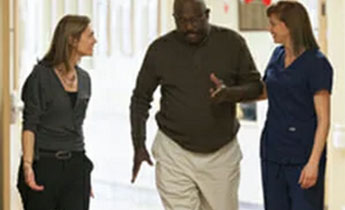Every day at 5 p.m., Julius Marbury would look up at the clock in his room. He knew that within minutes, his wife and daughter would walk through the door, asking about the work he’d done that day to re-build his strength.
Their visits to his 4th floor room in the Inpatient Rehabilitation unit at Weiss Hospital buoyed Julius. They motivated him to keep going in the name of a challenging diagnosis: Guillain-Barre.

Pronounced gee-YAH-buh-Ray, this rare disorder causes the immune system to attack nerves. That attack leads to weakness and tingling in the arms and legs, and can even cause paralysis. It may also affect speech and breathing. Researchers still aren’t sure what causes the onset, but have linked it to respiratory infection and stomach flu.
“Out of 100,000 people, it chose me,” Julius says.
Most individuals, however, have good recovery from even the most severe cases of Guillain–Barre Syndrome. Although, some continue to experience some weakness.
The symptoms blind-sided Julius, then age 65, early one morning. As he sat down to put on his shoes for work, he suddenly lost all of his core strength. He couldn’t stand and was completely unaware of what was happening.
“I thought it was the end of the world.” Julius says now, looking back after five years. “It blind-sided me, but it didn’t get the best of me.”
Julius knew he needed help immediately. He was able to reach his cell phone to call his wife, Vanessa, who left work right away to take him to the emergency room.
After being admitted to the hospital, doctors told Julius of his options. He would need months of intense physical therapy to re-build his strength and balance. Julius and Vanessa did their research, and chose Weiss for Julius’ therapy.
LEARNING TO WALK AGAIN
Day after day, Julius worked to re-build his strength. When he arrived at Weiss, he couldn’t even sit up to feed himself, let alone walk. Rehabilitation became his full-time job, seven days a week.
A group of physical and occupational therapists worked closely with him, and doctors monitored his progress daily. Director of Rehabilitation Services Heidi Behnke even called the floor on her days off to make sure Julius was working.
Julius and Vanessa say that because the staff went above and beyond, they know they chose the right place in Weiss’ Rehabilitation Center. “They really took great care of me. It was like a great friendship,” Julius says, adding that he still has pictures of himself with many of the therapists.
One therapist in particular worked closely with Julius, and Julius says he was especially touched when the therapist placed Julius’ feet on top of his own. Together they walked him down the hallway one step at a time so Julius could get accustomed to the movement again.
“When people care about you, they make you try a little more. The rebuilding was rough, but if you have the right help, you can do it,” Julius says. “It didn’t get to me at the time. Everything went great. People really went out of their way to help me recover.”
Behnke calls Julius “amazing.” She says, “He has such great faith and he’s motivated. He didn’t go into a deep depression. He had great support from his wife and family taking care of him.”
When Julius left Weiss two months later, Vanessa and daughter Christina were right there with him. Theysupported Julius mentally and physically—making sure he didn’t fall and hurt himself.
Five years later, Julius says, “Now, I just have to make do with what I’ve got. I have to be careful where I put my feet and balance myself.”
Julius still has physical difficulties such as weakness in his legs along with cramps in his hands, arms, and sides. But that doesn’t keep him from walking or driving short distances.
Julius says, “I had planned to work until I was 70, but God had another plan for me. He wanted me to spend more quality time with my wife and family.”
Learn more about Inpatient Rehabilitation at Weiss.
